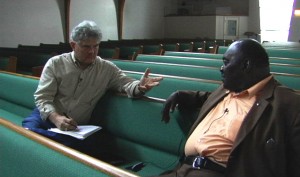Last week, I received the following email from a former student:
Hey Professor Darden:
I wanted to know what books I should read to become a better fiction-writer? I want to try and write fiction books.
A.T.
This was my response:
Dear A.T.:
Glad to hear you’re writing! I always recommend the same two books for people who are serious about writing:
Anne LaMott, Bird by Bird
Stephen King, On Writing
But since I’m a professor and what I do best is professing, here’s some general advice as well:
Continually read the best writers in the genre you want to write in.
Don’t write what you know. Write what you WANT to know. Writing will help you figure stuff out.
Think BIG.
Tell a story, first and foremost. Everything: dialogue, description, action should be designed to help tell the story. Exclusively. Avoid unnecessary dialogue, description, and action that are designed to show off your writing skills.
Write stories that YOU want to read.
Work from an outline.
One of your main characters must CHANGE by the end of the story.
Write for the sheer joy of it, not for getting published (that will happen if you do). Write every day. Write when you don’t feel like it. Just write. Get something on paper/get some pixels on a screen.
Use strong noun/verb sentences.
Do your homework when it comes to finding a published home for your writing.
Know that you’ll get lots of rejection letters/emails. It’s OK. It’s what we do.
Finally, Bird by Bird is so beautifully written, it is hard to extract quotes from it. On Writing, on the other hand, like most of Stephen King’s work, lends itself to anecdotes. Here are some of my favorite excerpts, some of which I Xeroxed when the book first came out. I can’t find my copy of the book (probably loaned it to someone), but I still have the Xeroxes:
Get the first draft done quickly…
I believe the first draft of a book — even a long one — should take no more than three months…Any longer and — for me, at least — the story begins to take on an odd foreign feel, like a dispatch from the Romanian Department of Public Affairs, or something broadcast on high-band shortwave during a period of severe sunspot activity.
On rewriting…
Write with the door closed, rewrite with the door open. Your stuff starts out being just for you, in other words, but then it goes out. Once you know what the story is and get it right — as right as you can, anyway — it belongs to anyone who wants to read it. Or criticize it.
Second drafts can only help so much…
“A movie should be there in rough cut,” the film editor Paul Hirsch once told me. The same is true of books. I think it’s rare that incoherence or dull storytelling can be solved by something so minor as a second draft.
Formula for success: 2nd Draft = 1st Draft – 10%…
Mostly when I think of pacing, I go back to Elmore Leonard, who explained it so perfectly by saying he just left out the boring parts. This suggest cutting to speed the pace, and that’s what most of us end up having to do (kill your darlings, kill your darlings, even when it breaks your egocentric little scribbler’s heart, kill your darlings)…
I got a scribbled comment that changed the way I rewrote my fiction once and forever. Jotted below the machine-generated signature of the editor was this mot: “Not bad, but PUFFY. You need to revise for length. Formula: 2nd Draft = 1st Draft – 10%. Good luck.”
Talent renders the whole idea of rehearsal meaningless; when you find something at which you are talented, you do it (whatever it is) until your fingers bleed or your eyes are ready to fall out of your head. Even when no one is listening (or reading, or watching), every outing is a bravura performance, because you as the creator are happy. Perhaps even ecstatic.
Some meaty detective-fiction similes…
My all-time favorite similes, by the way, come from the hardboiled-detective fiction of the forties and fifties, and the literary descendants of the dime-dreadful writers. These favorites include “It was darker than a carload of assholes” (George V. Higgins) and “I lit a cigarette that tasted like a plumber’s handkerchief” (Raymond Chandler).
On writing seminars and the desire for “the right writing environment”…
In truth, I’ve found that any day’s routine interruptions and distractions don’t much hurt a work in progress and may actually help it in some ways. It is, after all, the dab of grit that seeps into an oyster’s shell that makes the pearl, not pearl-making seminars with other oysters.
What scares the so-called master of fear?
The scariest moment is always just before you start.
I’ll end with a truism. In my classes, I have good writers and I have young people who want to be good writers. Invariably, when I talk about books, the good writers have generally read those books. Good writers read. Lots. Always have.
One last quote from King’s On Writing:
It’s hard for me to believe that people who read very little (or not at all in some cases) should presume to write and expect people to like what they have written.
Amen and amen.








